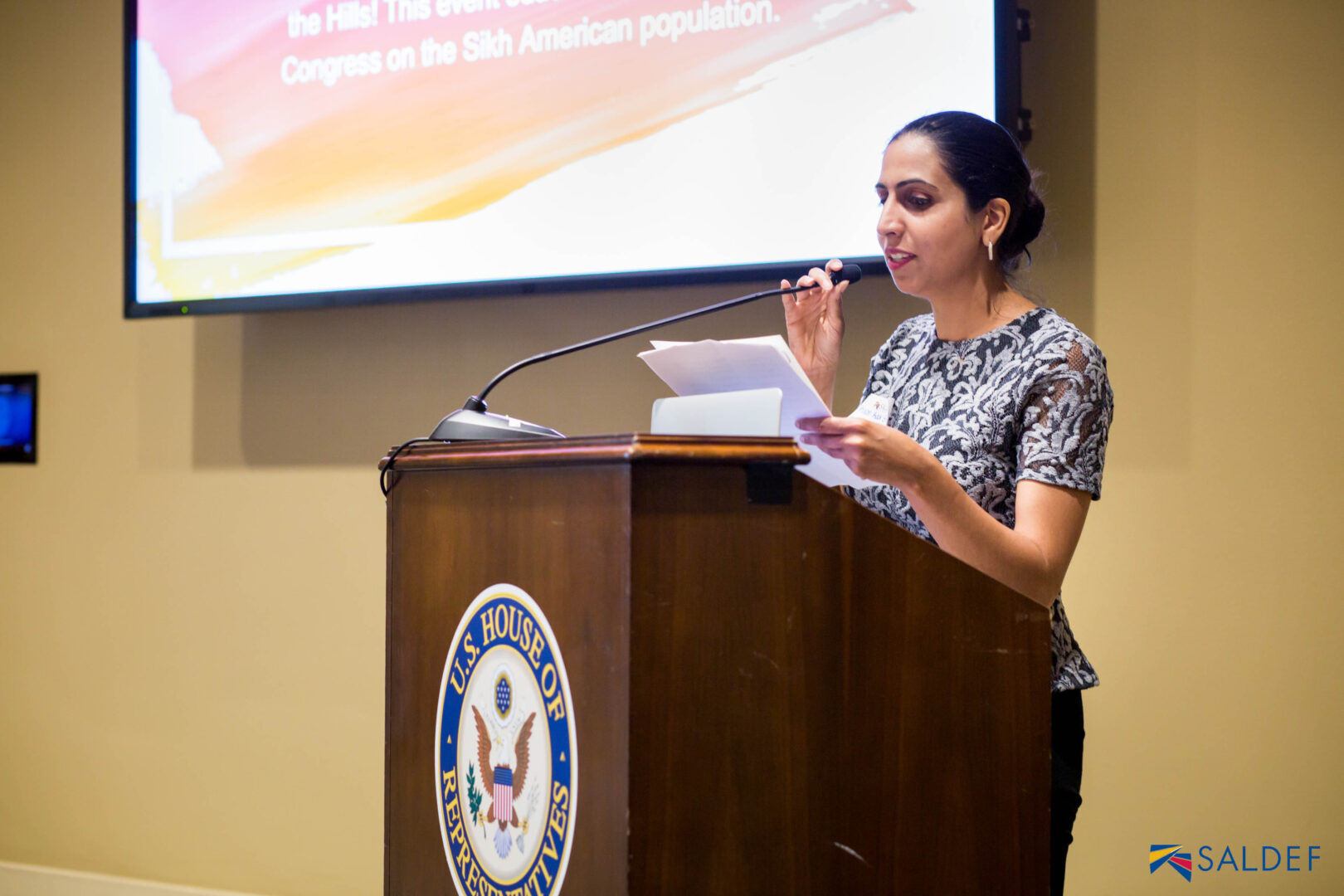
Key Issues
SALDEF works on an array of issues pertaining to our national sangat, all of which are informed by conversations with community members. As a 501(c)(3) nonprofit, we collaborate on a nonpartisan basis with all stakeholders interested in helping achieve a more tolerant and inclusive United States for Sikh Americans.
Our focus areas include:
- Civil Rights
- Voting Rights
- LGBTQ Equality
- Gender Equity
- Equal rights
- Racial & Religious Profiling
- Language Access and Data Disaggregation
- Religious Freedom & Accommodation
- Non-discrimination on our articles of faith and 5Ks
- Technology Policy
- Online Censorship
- Cultural competence in platforms’ moderation decisions
- Health Access
- Delivery of public health services for non-citizens
- Hate Crimes & White Supremacy
- Common Sense Gun Reform
- Gurdwara security
- Education and Bullying
- Immigration
- Asylum and Refugees
- DREAMers, DACA, and Undocumented persons
- Family immigration process
- Employment Discrimination
Below we present our key priorities for 2023 and 2024, informing our work with the 118th Congress and agencies in the executive branch during the second half of President Biden’s first term.
If you would like to join the conversation or share your ideas, please reach out.
As the first point of contact for many Sikh migrants seeking asylum in the United States, as well as the agency responsible for operating the nonprofit security grant program, the Department of Homeland Security is a critical federal stakeholder for the Sikh American community.
With Customs & Border Patrol, the DHS agency that processes asylum seekers upon their entry to this country, SALDEF is engaged in ongoing dialogue to deepen religious sensitivity and augment the training officers receive with Sikh-specific information. Our key priorities include:
- Development of a religious directive that protects the articles of faith of all migrants, regardless of their origin or expressed religion, and entails the safe return of those articles to their owners upon the completion of processing. Current guidance does not mention the handling of religious items at all, much less how to do so sensitively.
- Sikh-specific training that teaches agents the difference between Sikhs and other faiths and trains them in the correct etiquette in handling and searching dastaars and the five K’s, as well as increasing their sensitivity to why migrants carry these items.
- Much more robust language access, including updated Punjabi-language materials that allow detainees to know their rights distributed both online and in person, and proactive interpretation services offered to detainees.
With the office of Secretary Mayorkas, head of the Department of Homeland Security, SALDEF is working urgently to expand equity and access in the Nonprofit Security Grant program, which makes public funds available to faith-based nonprofits – like gurdwaras – for security purposes. Our key priorities include:
- Expansive qualitative surveys of sangats across the nation to assess the difficulties and opportunities for improvement in the nonprofit security grant application process.
- Broader language support and streamlining of the process for applicants who do not speak English or Spanish.
- Structuring more aggressive outreach by dedicated DHS personnel nationwide to local faith centers and faith-based communities to make them aware of and support them in the nonprofit security grant process.
While we work on Punjabi language access with our collaborators at DHS, we also work to broaden language access across all levels and agencies in the federal government, as well as state-by-state when opportunities arise.
In coalition with our partners, SALDEF strongly advocates for the federal government and all relevant contractors and recipients of federal funds to make Language Services available to LEP Individuals in an equitable fashion. Our key priorities include:
- The implementation of binding, enforceable guidelines for federal agencies to update their non-English, non-Spanish online user interfaces, taking recommendations from the recently published guide to Improve Access to Website and Digital Services for LEP Individuals.
- The provision of wrap-around services, like interpretation services. Live language assistance should include rapid rates of connection to interpreters via telephone, video, or electronically.
- Directives for government agencies to collect preferred language data in addition to disaggregating by race/ethnicity, without compromising identifiable data on LEP individuals.
- A government-wide commitment to increasing internal language access capacity, including establishing Language Access Coordinators to work cross-functionally across all services. Investments made in this area must not take away resources from civil rights operators tasked to provide language access services and oversight.
When adjusting for population size, Sikh Americans are among the most targeted minority groups in America in bias and discrimination incidents. This reality creates an urgent need for resources that support the recovery of all those affected by senseless acts of hate. While the 118th Congress is divided, we feel strongly that many issues are still bipartisan and offer possibilities for progress – like the need to combat domestic violence. Our key priorities include:
- Advocating to the offices of members of the Congressional Mental Health Caucus to work to pass bipartisan legislation to raise visibility for mental health care.
- Pushing for mental health reform legislation to specifically fund care for minorities, as in the Pursuing Equity in Mental Health Act and similar legislation introduced in both the House of Representatives and U.S. Senate.
- Collaborating with the Office of Victims of Crime in the Department of Justice to ensure that communities struck by tragedy have access to the resources they need to begin the healing process – and that those resources are delivered sensitively and in-language.
A persistent threat to the safety of Sikh Americans nationwide, and for all communities of color, LGBTQ+, and immigrant communities,, is the specter of white supremacy and systemic hate and bias. SALDEF remains committed to working with all stakeholders across all levels of government to root out this danger, with a particular focus on the executive branch. Our key priorities include:
- Securing adequate funding from the Department of Justice to investigate hate crimes, provide sensitive services for victims’ families and communities, and increase community safety collaboratively with local- and state-level stakeholders.
- Urging active participation in the Hate Crimes Statistics Act reporting program, with special attention devoted to large underreporting agencies. In particular, we are pushing the Department of Justice to ensure the nationwide adoption of the FBI’s National Incident-Based Reporting System (NIBRS) crime reporting program in 2021.
- Working toward the passage of the Domestic Terrorism Prevention Act, which empowers relevant federal departments to monitor and investigate domestic terrorism and white supremacy within the United States.
As a diasporic community, Sikh Americans are well positioned to understand the necessity of immigration policies that are humane, equitable, and rooted in compassion. SALDEF works with stakeholders across the federal government and Congress to help shape immigration policies that allow our community to thrive in the United States. Our key priorities include:
- Dedicated Punjabi-language translations of materials pertaining to both the family immigration and asylum processes, distributed online and to asylum seekers in person; as well as the provision of dedicated Punjabi language interpreters for Sikhs detained by any DHS agency.
- Government-wide implementation of a protections-first immigration framework, with its attendant focus on family and community ties, justice, and humanitarian interests; rather than the current enforcement priorities-based framework that redirects bias from one category of immigrants to another based on prevailing political winds.
- Passage in Congress of a path to citizenship for recipients of Delayed Action for Childhood Arrivals (DACA) protections. We believe very strongly that young immigrants who grew up in the United States, consider themselves to be American, and are productively contributing to society deserve the opportunity to stay in the only home that most of them have ever known.
SALDEF remains concerned about the persistent treatment of Asian American, Pacific Islander, and Native Hawaiian Americans as a monolith in public data. The outperformance of some subgroups masks enormous disparities in socioeconomic and educational attainment between different subgroups within the AAPI community. Our key priorities include:
- Disaggregation in key surveys across AAPI subgroups by the Census bureau, like the Current Population Survey Annual Social and Economic Supplement (CPS ASEC), the premier annualized measure of income among domestic-facing federal surveys; as well as the decennial Census.
- Active translation and outreach efforts by statistical agencies to disseminate in-language reporting with community advocates as standard operating procedure. AAPI groups must see and hear the stories these data tell about them, so that they can then be encouraged to participate in the data-gathering at the next opportunity.
The Sikh American Community’s Policy Platform
While we have focused here on a summary list of our issue areas and an outline of our key priorities for federal stakeholders in 2023 and 2024, SALDEF has also compiled a full policy platform that expansively discusses all of the policy and advocacy issue areas on which we work at a federal and state level.
We are happy to offer the full policy platform for free download to anyone in the community who is interested in learning more and/or engaging with the full breadth of our work. Simply email us and we will send the longform platform to you!
